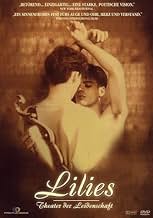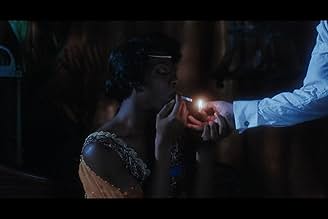VALUTAZIONE IMDb
7,4/10
2975
LA TUA VALUTAZIONE
Aggiungi una trama nella tua linguaWhen a bishop comes to a prison to hear the confession of an old friend he is forced to watch a play, performed by the inmates, about their youth together, love and betrayal.When a bishop comes to a prison to hear the confession of an old friend he is forced to watch a play, performed by the inmates, about their youth together, love and betrayal.When a bishop comes to a prison to hear the confession of an old friend he is forced to watch a play, performed by the inmates, about their youth together, love and betrayal.
- Regia
- Sceneggiatura
- Star
- Premi
- 8 vittorie e 14 candidature totali
Benoît Lagrandeur
- Prison Ensemble
- (as Benoit Lagrandeur)
Pierre Leblanc
- Prison Ensemble
- (as Pierre LeBlanc)
Jean Lévesque
- Prison Ensemble
- (as Jean Levesque)
Recensioni in evidenza
This film stands out in my collection as the most beautiful gay love story on film so far. It's lyrical story-telling is accented by it's Romeo & Juliet-inspired forbidden love theme, while avoiding any political message that plagues today's current stream of gay love stories. With it's gorgeous location, haunting sound-track and surreal moments of simple tenderness, Lilies succeeds at simply being a beautiful film.
This is a film of rare and astonishing brilliance, and unlike anything I personally have ever encountered before. It is exquisitely photographed and edited, and the acting is first rate all round. The all-male cast portraying both men and women might be off-putting for some, but it is performed so expertly that one forgets this detail - it is a film that magnificently transcends gender. In particular is Brent Carver's resplendent turn as the `mad countess,' the gentle, guileless mother of one of the young heroes. The story is a heartbreaking tale of love, jealousy, and ultimately, of Judgement Day, of the Day of Reckoning. That its storyline is about gay love should not put off heterosexual film goers, because the theme is timeless and universal. A bold and brilliant must see.'
This film is proof that some of the most iridescent, incredible films never make it to mainstream America. Barely anyone I know has even heard of this movie, and it's quite saddening. Although it has won numerous awards and lots of prestige in Canada, where it was made, I've often seen it lying on the shelf untouched at Blockbuster or gay film shops.
The movie begins with a prisoner named Simone who requests that a specific priest come to hear his confession. The priest, perplexed as to why he has been summoned, arrives at the prison, not knowing what to expect. It is soon divulged that the priest has some confessing of his own to be done when the prisoners trap him in his confessional box and begin to perform a play. This play is about Simone's childhood, when Simone was attending a Catholic all-boys boarding school and was in a gay relationship with his schoolmate, Valier. They keep their love clandestine until another schoolmate, Bilodeau (the priest as an adolescent), unearths something of what the two lovers have been doing. He confronts them about it, calling them a "disease," when it is revealed later that he is more insidious than they are.
Things take another dramatic turn when Simone's father discovers his son has kissed a boy and mutilates his body with a whip. Out of searing rage, Simone succombs to arson. A Parisian woman (who is portrayed by a male actor because the play is being performed by male prisoners) visits the schoool and falls in love with Simone. Despite the distinctely male features on her which expose the actor's gender, the he does an excellent job of emulating a pristine, romantic woman desperately seeking love.
Simone repudiates Valier, saying "it's time he started thinking about girls" and that he plans to marry the Parisian woman. Valier is devastated and runs to his mother, who is scorned by the rest of society because she believes herself to be a countess. She is shockingly compassionate and supportive when she learns of Valier's homosexuality. At the engagement banquet for Simone and his fiancee, Valier sabotages the celebration by dressing like a Greek God and reciting a monologue from the romantic Greek play he and his beloved were rehearsing together in the beginning of the film. And I can't tell you the rest. It'll ruin it. All I know is everyone should see this movie-especially gay Catholics. Incredible directing, eloquent dialogue, wonderfully abstract scenary-there's no way this movie could have been done better!
The movie begins with a prisoner named Simone who requests that a specific priest come to hear his confession. The priest, perplexed as to why he has been summoned, arrives at the prison, not knowing what to expect. It is soon divulged that the priest has some confessing of his own to be done when the prisoners trap him in his confessional box and begin to perform a play. This play is about Simone's childhood, when Simone was attending a Catholic all-boys boarding school and was in a gay relationship with his schoolmate, Valier. They keep their love clandestine until another schoolmate, Bilodeau (the priest as an adolescent), unearths something of what the two lovers have been doing. He confronts them about it, calling them a "disease," when it is revealed later that he is more insidious than they are.
Things take another dramatic turn when Simone's father discovers his son has kissed a boy and mutilates his body with a whip. Out of searing rage, Simone succombs to arson. A Parisian woman (who is portrayed by a male actor because the play is being performed by male prisoners) visits the schoool and falls in love with Simone. Despite the distinctely male features on her which expose the actor's gender, the he does an excellent job of emulating a pristine, romantic woman desperately seeking love.
Simone repudiates Valier, saying "it's time he started thinking about girls" and that he plans to marry the Parisian woman. Valier is devastated and runs to his mother, who is scorned by the rest of society because she believes herself to be a countess. She is shockingly compassionate and supportive when she learns of Valier's homosexuality. At the engagement banquet for Simone and his fiancee, Valier sabotages the celebration by dressing like a Greek God and reciting a monologue from the romantic Greek play he and his beloved were rehearsing together in the beginning of the film. And I can't tell you the rest. It'll ruin it. All I know is everyone should see this movie-especially gay Catholics. Incredible directing, eloquent dialogue, wonderfully abstract scenary-there's no way this movie could have been done better!
LILIES, based on a Canadian play 'Les feluettes' by Michel Marc Bouchard, has been adapted to the screen by Bouchard and placed in the sensitive hands of director John Greyson, an artist who is able to indulge in surrealism with reality and make it work well. This very beautiful film is cast entirely with men despite the fact that there are women roles in the story. How does he make that work successfully without pandering to artiness? View this little film and make the discovery for your self.
Set in Quebec in a prison, Bishop Bilodeau (Marcel Sabourin) has been summoned form the outside to hear the confession of 'a very sick man' who has been imprisoned for 40 years for a murder. Upon the Bishop's arrival the audience knows something is amiss: despite the atmosphere of the prison as a stage accompanied by choral singing of plainsong (The Hilliard Ensemble) there are props and images that seem out of place in a grim prison. The Bishop is ushered into the confessional booth and when he opens the window to hear confession, the person in the seat is Simon (Aubert Pallascio) the 'very sick' man who has planned for the bishop to watch a play depicting the 40 year old crime - a reverse on the confessional stance.Through a small aperture in the bishop's now locked confessional, the Bishop is forced to watch a reenactment of the incident 40 years ago when two young boys, Simon (Jason Cadieux) and Vallier (Danny Gilmore) were in love and the young future Bishop (Matthew Ferguson) was jealous of Vallier's attention from Simon and played a key role in 'murder' of Vallier that resulted in Simon's being accused and imprisoned. The atmosphere leading up to this act includes the reaction from the small town's homophobia and to Simon's sexual ambiguity that involves a strange lady Lydie-Anne (Alexander Chapman) who arrives form Paris via an air balloon. It is the interaction of the boys with the townsfolk, the new lady arrival who desires Simon's affections, and Vallier's understanding and self-sacrificing mother Countess De Tilly (Brent Carver) that leads to the fateful death of Simon. How the story ends in the confessional booth reversal is the beauty of the film that must be left unsaid for the drama to affect potential audiences of this movie.
The cast is all male because the whole story is a mise-en-scene, a play within a play, where all parts are acted by the prisoners for the sake of displaying truth to the Bishop. There is no pretense at making the men look like women except for the costumes and this enhances the message of the story. The actors are excellent and the impact of the story is powerful. Yes, this is a highly honored gay-themed film, but it is really more about the power of love both in youths and in thwarted adults that makes it a film for all audiences. Highly Recommended. Grady Harp
Set in Quebec in a prison, Bishop Bilodeau (Marcel Sabourin) has been summoned form the outside to hear the confession of 'a very sick man' who has been imprisoned for 40 years for a murder. Upon the Bishop's arrival the audience knows something is amiss: despite the atmosphere of the prison as a stage accompanied by choral singing of plainsong (The Hilliard Ensemble) there are props and images that seem out of place in a grim prison. The Bishop is ushered into the confessional booth and when he opens the window to hear confession, the person in the seat is Simon (Aubert Pallascio) the 'very sick' man who has planned for the bishop to watch a play depicting the 40 year old crime - a reverse on the confessional stance.Through a small aperture in the bishop's now locked confessional, the Bishop is forced to watch a reenactment of the incident 40 years ago when two young boys, Simon (Jason Cadieux) and Vallier (Danny Gilmore) were in love and the young future Bishop (Matthew Ferguson) was jealous of Vallier's attention from Simon and played a key role in 'murder' of Vallier that resulted in Simon's being accused and imprisoned. The atmosphere leading up to this act includes the reaction from the small town's homophobia and to Simon's sexual ambiguity that involves a strange lady Lydie-Anne (Alexander Chapman) who arrives form Paris via an air balloon. It is the interaction of the boys with the townsfolk, the new lady arrival who desires Simon's affections, and Vallier's understanding and self-sacrificing mother Countess De Tilly (Brent Carver) that leads to the fateful death of Simon. How the story ends in the confessional booth reversal is the beauty of the film that must be left unsaid for the drama to affect potential audiences of this movie.
The cast is all male because the whole story is a mise-en-scene, a play within a play, where all parts are acted by the prisoners for the sake of displaying truth to the Bishop. There is no pretense at making the men look like women except for the costumes and this enhances the message of the story. The actors are excellent and the impact of the story is powerful. Yes, this is a highly honored gay-themed film, but it is really more about the power of love both in youths and in thwarted adults that makes it a film for all audiences. Highly Recommended. Grady Harp
"Lilies" is an achingly beautiful work. The acting, cinematography, music and sets are stunning. The use of only male actors, including for female characters, seems right here. And in the final analysis, the best and worst of human emotion (especially concealed jealously) becomes so vividly portrayed that one is not sure whether to laugh, cry, or yell out with anger at the characters' actions. Anyone who considers themselves a "cinema buff" should put this one one their "must see" list. So, when does the DVD come out???
Lo sapevi?
- Citazioni
Young Simon: [to Vallier] I shall be reborn. My breath in the heavens, bear witness. We shall be free. We'll we be loved. If you do truly love me, let your love be known unto me.
I più visti
Accedi per valutare e creare un elenco di titoli salvati per ottenere consigli personalizzati
- How long is Lilies?Powered by Alexa
Dettagli
Botteghino
- Budget
- 2.200.000 CA$ (previsto)
- Lordo Stati Uniti e Canada
- 301.548 USD
- Fine settimana di apertura Stati Uniti e Canada
- 28.781 USD
- 12 ott 1997
- Lordo in tutto il mondo
- 301.548 USD
Contribuisci a questa pagina
Suggerisci una modifica o aggiungi i contenuti mancanti
































